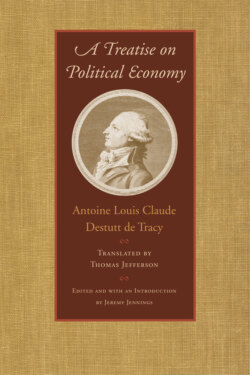Читать книгу A Treatise on Political Economy - Antoine Louis Claude Destutt De Tracy - Страница 33
На сайте Литреса книга снята с продажи.
CHAPTER X.
ОглавлениеConsequences and development of the two preceding Chapters.
Let us recollect first, that we all have separate interests, and unequal means.
Secondly. That nevertheless we are all united by the common interests of proprietors and consumers.
Thirdly. That, consequently, there are not in society classes which are constantly enemies to one another.
Society divides itself into two great classes, wage earners and employers.
This second class contains two species of men, namely the idle who live on their revenue.
Their means do not augment.
And the active who join their industry to the capitals they may possess. Having reached a certain term their means augment but little.
The funds on which the stipendiaries live become therefore with time nearly a constant quantity.
Moreover the class of wage earners receives the surplus of all the others.
Thus the extent which that surplus can attain determines that of the total population of which it explains all the variations.
It follows thence that whatever is really useful to the poor, is always really useful to society at large.
As proprietors the poor have an interest, first that property be respected. The preservation even of that which does not belong to them, but from which they are remunerated is important to them. It is just and useful also to leave them masters of their labour, and of their abode.
Secondly. That wages be sufficient. It is of importance also to society that the poor should not be too wretched.
Thirdly. That these wages be steady. Variations in the different branches of industry are an evil. Those in the price of grain are a still greater one. Agricultural people are greatly exposed to the latter. Commercial people are rarely exposed to the former, except through their own fault.
As consumers the poor have an interest that manufacturing should be economical, the means of communication easy, and commercial relations numerous. The simplification of process in the arts, the perfection of method are to them a benefit and not an evil. In this their interest is also that of society in general.
After the opposition of our interests let us examine the inequality of our means.
All inequality is an evil, because it is a mean of injustice.
Let us distinguish the inequality of power from inequality of riches.
Inequality of power is the most grievous. It is that which exists among savages.
Society diminishes the inequality of power; but it augments that of riches, which carried to an extreme reproduces that of power.
This inconvenience is more or less difficult to avoid, according to different circumstances. Thence the difference in the destinies of nations.
It is this vicious circle which explains the connexion of many events which have been always spoken of in a manner very vague and very unexact.
